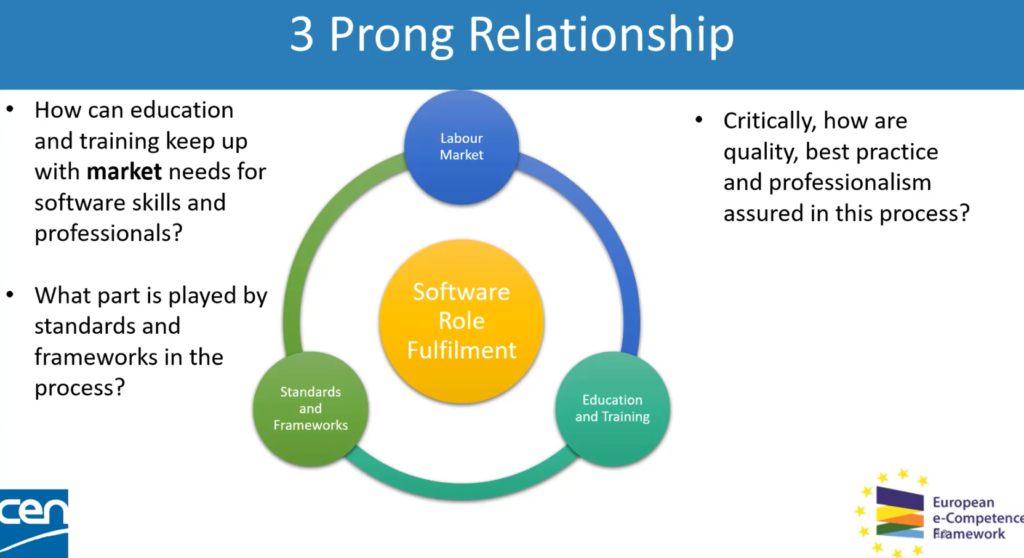Today, 52% of European workers are in need of reskilling — notably with key in-demand digital skills.
In the 2021 Digital Economy and Society Index (DESI) analysis [1], over 70% of businesses report a lack of staff with adequate (digital) skills as an obstacle to investment. Therefore, there is no other option but to urgently invest in digital skills and lifelong opportunities for Europeans in order to remain competitive.
The European Commission is setting ambitious Digital Decade targets with the aim to employ 20 million ICT specialists in Europe by 2030, with convergence between men and women[2]. This vision can only be achieved with strong sectoral cooperation between public authorities, learning providers, and companies from across Europe, committed to skill, upskill, or reskill individuals. It is also one of the core missions of the European Software Skills Alliance (ESSA) — currently looking at answering the very challenges faced by the public and private sectors to train young people and professionals for the (software) tech-driven jobs of tomorrow.
At first glance, this poses some challenges as education and training are fragmented across the EU. Emerging software skills must also be an integral part of the design of new/updated training programmes answering future market needs. On May 17, ESSA organised a webinar to discuss some of these challenges with experts and policymakers. They explored current and future software skill gaps and how the educational offerings can meet market demand for emerging professional software roles. Read on to learn about the takeaways of this interesting discussion organised in the context of the 2022 European Commission’s European Vocational Skills Week.
Why standards and frameworks matter
“The key point is that quality is embedded in the process of addressing the software role fulfilment, as we move forward.” said Mary Cleary, Secretary-General at the Irish Computer Society and Chair of CEN/TC 428. It is important to acknowledge the relationship between the market, standards & frameworks, and education & training. While the market provides the data needed to develop agile and forward-looking curricula, they must also be informed by standards and frameworks developed by experts to reach the (software) IT professional requirements.
As Europe struggles with a shortage of ICT professionals, companies and education and training providers need to focus on attracting new talents — young people, women, career changers — and identify current and emerging software skills. Retaining talents within the software industry is also key as well as encouraging employees to gain new (software) skills.
Relevant standards and frameworks play a pivotal role in developing a unifying approach to curricula design and recognition across the EU. The European e-Competence Framework (e-CF) and the foundational body of knowledge for the ICT profession (ICT BoK) are two good examples.
It is also worth highlighting that standards ensure the futureproofing of the curriculum by supporting current and future employment needs. Therefore, the design, the methodology, and the process of the next generation of educational profiles for professional software roles need to be guided by technical specification principles.
Moreover, standards provide quality assurance, a framework of ethics and a common language to describe the key activities of a profession. They also delineate success criteria and offer citizens and professionals a sense of professional responsibility. Therefore, it is vital that standards are kept at the core of developing ICT curriculum guidelines.
Matching the supply of software skills with the market’s demand
As the EU looks at how to increase the number of ICT specialists to 20 million over the next eight years, it is essential to attract more young people into the ICT industry. In 2019, only 30% of the total number of university graduates earned a degree in ICT while, today, women represent less than 20% of all ICT specialists.
All players, from universities to industry to policymakers, need to work closely together to bridge the digital skills gap. The EU is committed to supporting the development of future-focused skills, such as AI, quantum technologies, software and cybersecurity. Addressing directly the needs of SMEs by widening the access to funding schemes remains also important as they represent 99% of all businesses in the EU: “We really want to support SMEs in providing their staff with training opportunities and offering them, through the Digital Europe Programme, a 75% funding rate so they can participate in the consortium’” said Arthur Tréguier, Policy Assistant, European Commission.
The EU needs a constructive and balanced two-way relationship between universities and companies. Not only for improving the relevance of education and training vis-a-vis the market’s needs but also for further developing ‘power skills’ and profession-related skills via work-based learning and other types of collaboration. “As we learned from […] the ESSA project, soft skills are as important as hard skills, and I believe this is where universities may need to rely on companies…” said Balint Gyres-Tóth (PhD) from Budapest University of Technology and Economics.
Many big companies address reskilling and upskilling on a rolling basis as part of their strategy to remain competitive in the market. They provide their employees with learning pathways and certifications in line with the broader industry and technology trends. At Amazon Web Service, “We don’t make much difference between university education and professional education. We use the same building blocks which are always our [AWS] learning pathways, our certifications” said Elmar Husmann, Digital Skills Program Manager. To facilitate upskilling and reskilling, it is important to look at shorter learning units and micro-credential based programmes.
WATCH THE WEBINAR
_________________________________________________________________________________________
[1] https://digital-strategy.ec.europa.eu/en/policies/desi
[2] https://ec.europa.eu/info/strategy/priorities-2019-2024/europe-fit-digital-age/europes-digital-decade-digital-targets-2030_en#documents


